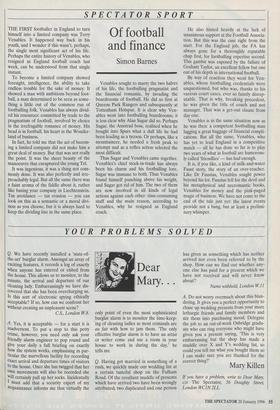SPECTATOR SPORT
Of football and finance
Simon Barnes
THE FIRST footballer in England to turn himself into a limited company was Terry Venables. It happened way back in his youth, and I wonder if this wasn't, perhaps, the single most significant act of his life. Perhaps the entire history of Venables, who resigned as England football coach last week, can be understood from that single instant.
To become a limited company showed foresight, intelligence, the ability to take endless trouble for the sake of money. It showed a man with ambitions beyond foot- ball, a man determined to be seen as some- thing a little out of the common run of footballing folk. Venables has always divid- ed his resources: committed by trade to the pragmatism of football, involved by choice in the irrefragable romance of money. His head is in football, his heart in the Wonder- land of business.
In fact, he told me that the act of becom- ing a limited company did not make him a great deal of money. But that was not really the point. It was the sheer beauty of the manoeuvre that enraptured the young Tel.
It was ingenious, it was a thing not com- monly done. It was also perfectly and irre- proachably legal. But all the same there was a faint aroma of the fiddle about it, rather like basing your company in Liechtenstein. Tax avoidance — tax evasion — you can look on this as a semantic or a moral divi- sion as you choose, but it is always hard to keep the dividing line in the same place. Venables sought to marry the two halves of his life, the footballing pragmatist and the financial romantic, by invading the boardrooms of football. He did so first at Queens Park Rangers and subsequently at Tottenham Hotspur. It is clear why Ven- ables went into footballing boardrooms; it is less clear why Alan Sugar did so. Perhaps Sugar, the Amstrad boss, realised when he bought into Spurs what a dull life he had been leading as a tycoon. Or perhaps, like a mountaineer, he needed a fresh peak to attempt and as a reflex action selected the most difficult.
Thus Sugar and Venables came together. Venables's chief stock-in-trade has always been his charm and his footballing lore. Sugar was immune to both. Thus Venables found himself punching above his weight, and Sugar got rid of him. The two of them are now involved in all kinds of legal actions against each other: time-consuming stuff and the main reason, according to Venables, why he resigned as England coach. He also hinted heavily at the lack of unanimous support at the Football Associa- tion. But this was the case right from the start. For the England job, the FA has always gone for a thoroughly reputable chap first, for footballing expertise second. This gambit was exposed by the failure of Graham Taylor, an excellent fellow but one out of his depth in international football.
By way of reaction they went for Ven- ables, whose footballing credentials were unquestioned, but who was, thanks to his various court cases, ever so faintly disrep- utable. That is why, breaking precedent, he was given the title of coach and not manager. That was a get-out clause from day one.
Venables is in the same situation now as he was then: a competent footballing man lugging a great baggage of financial compli- cations. But all the same, Venables, who has yet to lead England in a competitive match — all he has done so far is to play two years of what in football are humorous- ly called 'friendlies' — has had enough.
It is, if you like, a kind of milk-and-water Faust story, the story of an over-reacher. Like Dr Faustus, Venables sought power beyond his lot. Faustus fell for the devil and his metaphysical and necromantic books, Venables for money and the pink-paged magic of business. We have not come to the end of the tale just yet: the latest events provide not a bang, but at least a prelimi- nary whimper.


























































 Previous page
Previous page